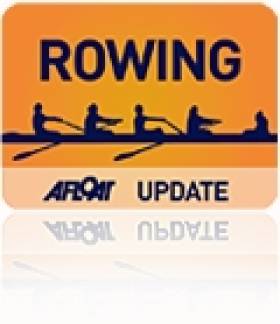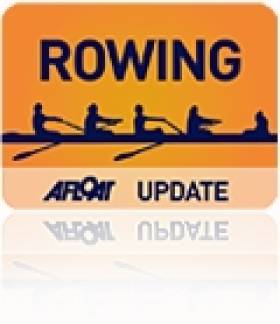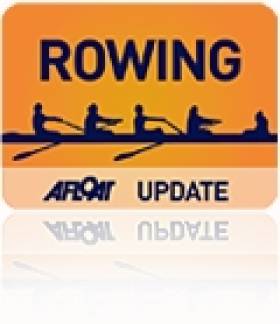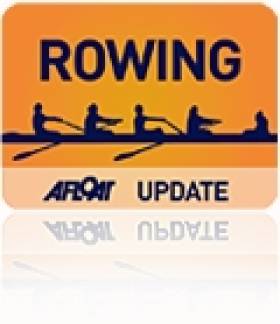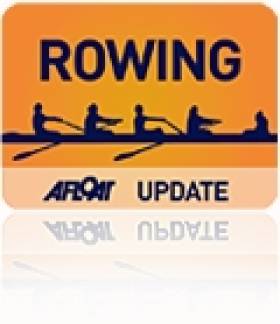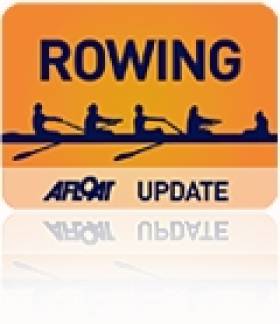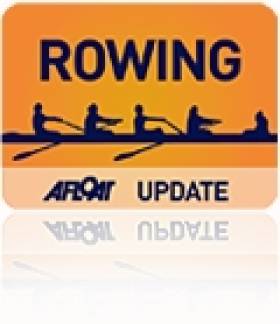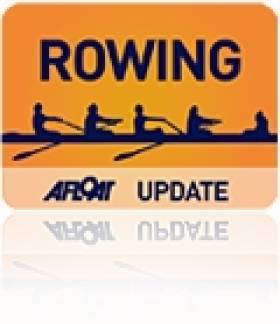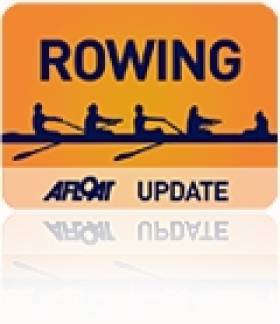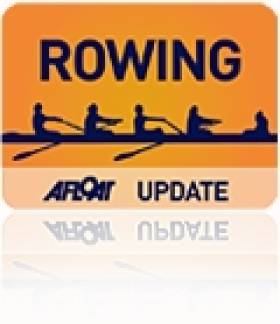Displaying items by tag: World Championships,
# ROWING: The Ireland senior men’s crews at the World Rowing Championships in Plovdiv in Bulgaria will finish their programmes competing in C and D Finals.
Lightweight single sculler Niall Kenny finished a safe second in his C/D semi-final, but the lightweight pair finished third of three in theirs and with the last crew being consigned to the D Final, this will be how they finish their regatta.
Paul O’Donovan won his C/D Semi-Final of the junior single scull. The Skibbereen man, who came within a tenth of a second of qualifying for the A/B Semi-Finals earlier in the day, was an emphatic winner from Peter Purcell Gilpin of Zimbabwe.
In the women’s junior single, Kate O’Brien finished fifth in her C/D Semi-Final. She tracked the leaders down the course in fourth for most of the race but was pushed into fifth near the end.
World Rowing Championships, Plovdiv, Bulgaria – Day Three (Irish interest)
Men
Lightweight Pair – C/D Semi-Finals (First Two to C Final, One to D Final; Only Three Crews Competed): 1 Russia 6:54.46, 2 Japan 6:57.50; 3 Ireland (M O’Donovan, A English) 7:00.77.
Junior Pair – Repechage Four (First Two to A/B Semi-Final; rest to C/D Semi-Final): 1 Ireland (C Black, J Cassells) 6:53.11, 2 Czech Republic 6:53.55; 3 Spain 6:56.80, 4 Ukraine 7:19.31, 5 Denmark 7:28.63.
Lightweight Single Sculls – C/D Semi-Finals (First Three to C Final; rest to D Final): 1 Germany 7:16.86, 2 Ireland (N Kenny) 7:19.67, 3 Japan 7:20.36.
Junior Single Sculls – Quarter-Final Two (First Three to A/B Semi-Final; rest to C/D Semi-Final): 1 Azerbaijan 7:08.77, 2 Germany 7:11.13, 3 Belarus 7:12.37; 4 Ireland (P O’Donovan) 7:12.46, 5 Austria 7:27.00, 6 Denmark 7:34.99. C/D Semi-Finals (First Three to C Final; rest to D Final): 1 Ireland (O’Donovan) 7:25.81, 2 Zimbabwe 7:27.99, 3 United States 7:31.97.
Women
Junior Quadruple Sculls – Semi-Final Two (First Three to A Final; rest to B Final): 1 New Zealand 6:40.77, 2 United States 6:42.25, 3 Germany 6:42.46, 4 China 6:43.28, 5 Ireland (K Cromie, H Shinnick, B Jacques, B Walsh) 6:51.54, 6 Greece 6:55.84.
Junior Single Sculls – Quarter Finals (First Three to A/B Semi-Final; rest to C/D Semi-Final): 1 Romania 8:02.92, 2 Sweden 8:07.68, 3 Poland 8:09.84; 4 Russia 8:13.92, 5 Ireland (K O’Brien) 8:17.69, 6 Tunisia 8:29.53. C/D Semi-Finals (First Three to C Final; rest to D Final): 1 Czech Republic 8:18.03, 2 Brazil 8:21.39, 3 United States 8:24.31, 4 Tunisia 8:27.27, 5 Ireland (O’Brien) 8:29.11, 6 Bulgaria 8:33.57.
Lightweight Single Sculls – A/B Semi-Final Two (First Three to A Final; rest to B Final): 1 United States 7:49.85, 2 Austria 7:49.92, 3 Belarus 7:50.25; 4 Italy 7:54.51, 5 China 8:00.95, 6 Ireland (C Lambe) 8:14.64.
Lambe Set for B Final at World Rowing Championships
# ROWING: Claire Lambe’s hopes of qualifying for the A Final of the lightweight single sculls at the World Rowing Championships in Plovdiv in Bulgaria fell away in the third quarter of her semi-final today. The Dubliner was competitive to halfway, although by this stage it was clear that the United States, Austria and Belarus had a strong hold on the three qualification places, though China’s Wang Miao was still pushing in fourth. Lambe had been holding off Elisabetta Sancassani of Italy in a battle for fifth, but the Italian pushed through her and later passed the Chinese as well. Lambe eventually finished sixth.
The Ireland junior women’s quadruple are also set for tomorrow’s B Final (places seven to 12). At the head of the field in their semi-final New Zealand, the United States and Germany took the A Final places, with China joining Ireland in the B Final after being pushed into fourth. The Ireland crew of Katie Cromie, Hilary Shinnick, Bridget Jacques and Bernadette Walsh won their private battle with Greece for fifth by virtue of a good finish.
World Rowing Championships, Plovdiv, Bulgaria – Day Three (Irish interest)
Men
Junior Pair – Repechage Four (First Two to A/B Semi-Final; rest to C/D Semi-Final): 1 Ireland (C Black, J Cassells) 6:53.11, 2 Czech Republic 6:53.55; 3 Spain 6:56.80, 4 Ukraine 7:19.31, 5 Denmark 7:28.63.
Junior Single Sculls – Quarter-Final Two (First Three to A/B Semi-Final; rest to C/D Semi-Final): 1 Azerbaijan 7:08.77, 2 Germany 7:11.13, 3 Belarus 7:12.37; 4 Ireland (P O’Donovan) 7:12.46, 5 Austria 7:27.00, 6 Denmark 7:34.99.
Women
Junior Quadruple Sculls – Semi-Final Two (First Three to A Final; rest to B Final): 1 New Zealand 6:40.77, 2 United States 6:42.25, 3 Germany 6:42.46, 4 China 6:43.28, 5 Ireland (K Cromie, H Shinnick, B Jacques, B Walsh) 6:51.54, 6 Greece 6:55.84.
Junior Single Sculls – Quarter Finals (First Three to A/B Semi-Final; rest to C/D Semi-Final): 1 Romania 8:02.92, 2 Sweden 8:07.68, 3 Poland 8:09.84; 4 Russia 8:13.92, 5 Ireland (K O’Brien) 8:17.69, 6 Tunisia 8:29.53.
Lightweight Single Sculls – A/B Semi-Final Two (First Three to A Final; rest to B Final): 1 United States 7:49.85, 2 Austria 7:49.92, 3 Belarus 7:50.25; 4 Italy 7:54.51, 5 China 8:00.95, 6 Ireland (C Lambe) 8:14.64.
Lambe Races Into World Rowing Championships Semi-Finals
# ROWING: Claire Lambe produced a good performance in her repechage of the lightweight single sculls at the World Rowing Championships in Plovdiv in Bulgaria today. The 22-year-old Dubliner needed to finish in the top two to qualify for the A/B semi-finals in a race which included Fabiana Beltrame of Brazil, the reigning World Champion, and Leonie Pless of Germany, a World Cup silver medallist in Lucerne this year. Lambe moved into second, over three lengths clear of Pless, by 1250 metres and pushed Beltrame over the rest of the race, although the Brazilian – who competed in the Olympics in the lightweight double sculls – did open up a gap by the finish.
Niall Kenny could not make it into the top three of his lightweight single sculls quarter final. His fourth-place finish behind Italy, Slovakia and Slovenia, sends him to the C/D semi-finals.
Mark O’Donovan and Anthony English finished a disappointing fourth and last in their repechage of the men’s lightweight pair. Two crews qualified for the A/B Semi-finals, and Canada and Italy fought it out for the lead. Ireland were not able to make it into this set, but held third until they were passed coming up to the line by Hong Kong.
World Senior and Junior Rowing Championships, Plovdiv, Bulgaria – Day Two (Irish interest)
Men
Lightweight Pair – Repechage Three (First Two to A/B Semi-Finals; rest to C/D Semi-Finals): 1 Canada 7:00.48, 2 Italy 7:01.81, 3 Hong Kong 7:06.93, 4 Ireland (M O’Donovan, A English) 7:07.40.
Junior Pair – Heat Three (Winner directly to A/B Semi-Final; rest to repechages): 1 Romania 6:46.98, 2 Germany 6:53.83, 3 Poland 6:58.00, 4 Ireland (C Black, J Cassells) 6:59.13, 5 Estonia 7:13.74.
Lightweight Single Scull – Quarter Final Two (First Three to A/B Semi-Finals; rest to C/D Semi-Finals) 1 Italy 7:16.04, 2 Slovakia 7:20.77, 3 Slovenia 7:21.94; 4 Ireland (N Kenny) 7:24.42, 5 Hong Kong 7:32.44, 6 Japan 7:37.21.
Junior Single Scull – Heat Four (First Four to Quarter-Finals): 1 China (Ganggang Li) 7:08,24, 2 Ireland (P O’Donovan) 7:13.05, 3 Zimbabwe (P Purcell Gilpin) 7:14.77, 4 Estonia (A Luenekund) 7:22.12; 5 Japan 7:27.06.
Women
Junior Quadruple – Repechage One (First Three to A/B Semi-Final; rest to C Final): 1 Germany 6:38.45, 2 Italy 6:43.88, 3 Ireland (K Cromie, H Shinnick, B Jacques, B Walsh) 6:46.34; 4 Denmark 6:47.68, 5 Ukraine 7:02.24.
Lightweight Single Scull – Repechage Four (First Two to A/B Semi-Final; rest to C/D Semi-Final): 1 Brazil (F Beltrame) 8:02.62, 2 Ireland (C Lambe) 8:05.35; 3 Germany 8:09.65, 4 Japan 8:10.58, 5 Mexico 8:26.49.
Junior Single Scull – Heat Four (Four Guaranteed Quarter-Finals; fastest of rest to Quarter-Finals; rest to Final E): 1 Belarus (K Staraselets) 7:57.89, 2 Chile (N Sanchez Rojas) 8:09.53, 3 Ireland (K O’Brien) 8:13.90, 4 Ukraine (D Serebrianska) 8:16.83; 5 Uganda 10:14.48.
Spirited Performance Puts Young Ireland Crew in Semi-Finals of World Rowing Championships
# ROWING: The Ireland junior women’s quadruple of Katie Cromie, Hilary Shinnick, Bridget Jacques and stroke woman Bernadette Walsh showed great character to take third in their repechage and qualify for the semi-finals of the World Rowing Championships in Plovdiv in Bulgaria today.
Three places were available, and in the early stages it seemed that eventual winners Germany would be joined by Italy and Denmark. Behind them the young Ireland crew were battling with Ukraine for fourth. But by halfway the Irish, roared on by their support, were closing in on Denmark. They passed the Danes in the next 500 metres and fought off their attempts to regain third in the final quarter.
All but Cromie in the Ireland crew are 17 years of age.
World Senior and Junior Rowing Championships, Plovdiv, Bulgaria – Day Two (Irish interest)
Men
Junior Pair – Heat Three (Winner directly to A/B Semi-Final; rest to repechages): 1 Romania 6:46.98, 2 Germany 6:53.83, 3 Poland 6:58.00, 4 Ireland (C Black, J Cassells) 6:59.13, 5 Estonia 7:13.74.
Junior Single Scull – Heat Four (First Four to Quarter-Finals): 1 China (G Li) 7:08,24, 2 Ireland (P O’Donovan) 7:13.05, 3 Zimbabwe (P Purcell Gilpin) 7:14.77, 4 Estonia (A Luenekund) 7:22.12; 5 Japan 7:27.06.
Women
Junior Quadrple – Repechage One (First Three to A/B Semi-Final; rest to C Final): 1 Germany 6:38.45, 2 Italy 6:43.88, 3 Ireland (K Cromie, H Shinnick, B Jacques, B Walsh) 6:46.34; 4 Denmark 6:47.68, 5 Ukraine 7:02.24.
Junior Single Scull – Heat Four (Four Guaranteed Quarter-Finals; fastest of rest to Quarter-Finals; rest to Final E): 1 Belarus (K Staraselets) 7:57.89, 2 Chile (N Sanchez Rojas) 8:09.53, 3 Ireland (K O’Brien) 8:13.90, 4 Ukraine (D Serebrianska) 8:16.83; 5 Uganda 10:14.48.
# ROWING: Paul O’Donovan took second in his heat of the junior single sculls to ease into the quarter-finals of the World Rowing Championships in Plovdiv in Bulgaria. China’s Ganggang Li ran away with the race. Four of the five crews qualified, but the big Chinese sprinted away from the rest and was never caught. O’Donovan came closest, but even the pugnacious Skibbereen man could not wrest the lead from Li Ganggang. Zimbabwe and Estonia took third and fourth, while Japan, in fifth, lost out.
Kate O’Brien will also compete in the quarter-finals of the junior women’s single scull. A good scull in her heat by the St Michael’s athlete saw her take third place behind Belarus and Chile and ahead of Ukraine, with all four qualifying.
World Senior and Junior Rowing Championships, Plovdiv, Bulgaria – Day Two (Irish interest)
Men
Junior Pair – Heat Three (Winner directly to A/B Semi-Final; rest to repechages): 1 Romania 6:46.98, 2 Germany 6:53.83, 3 Poland 6:58.00, 4 Ireland (C Black, J Cassells) 6:59.13, 5 Estonia 7:13.74.
Junior Single Scull – Heat Four: 1 China (G Li) 7:08,24, 2 Ireland (P O’Donovan) 7:13.05, 3 Zimbabwe (P Purcell Gilpin) 7:14.77, 4 Estonia (A Luenekund) 7:22.12; 5 Japan 7:27.06.
Women
Junior Single Scull – Heat Four (Four Guaranteed Quarter-Finals; fastest of rest to Quarter-Finals; rest to Final E): 1 Belarus (K Staraselets) 7:57.89, 2 Chile (N Sanchez Rojas) 8:09.53, 3 Ireland (K O’Brien) 8:13.90, 4 Ukraine (D Serebrianska) 8:16.83; 5 Uganda 10:14.48.
# ROWING: Ireland’s Chris Black and Joel Cassells must negotiate a repechage to make the A/B semi-finals of the junior men’s pair at the World Rowing Championships in Plovdiv in Bulgaria. The Bann crew found themselves in the fastest heat of four this morning and finished fourth. Romania set the pace and won in a quick time of six minutes 46.98 seconds despite the challenge of Germany and Ireland over the first half of the race. Poland took over from Ireland in third in the closing stages and held off a late push by Black and Cassells.
World Senior and Junior Rowing Championships, Plovdiv, Bulgaria – Day Two (Irish interest)
Men
Junior Pair – Heat Three (Winner directly to A/B Semi-Final; rest to repechages): 1 Romania 6:46.98, 2 Germany 6:53.83, 3 Poland 6:58.00, 4 Ireland (C Black, J Cassells) 6:59.13, 5 Estonia 7:13.74.
# ROWING: Niall Kenny claimed third place in his heat of the lightweight single sculls to progress to the quarter-finals of the World Senior and Junior Rowing Championships in Plovdiv in Bulgaria today. The Galway man slotted in behind Hungary and Poland and ahead of Korea to guarantee himself meaningful action tomorrow.
The lightweight men’s pair finished fifth and last in a fascinating heat. Just one crew moved directly into the semi-finals. Germany looked like that crew until the final 500 metres, when they folded under pressure from the United States, who won, and Denmark, who took second.
Claire Lambe was in an extremely difficult heat of the lightweight single sculls. Alexandra Tsiavou of Greece was fresh from claiming bronze at the Olympic Games in the lightweight double scull – and proved fresh in competition as well, giving no encouragement to ther opposition as she grabbed hold of the one direct qualification place for the semi-finals. Lambe could not shift out of fifth and will compete in a repechage tomorrow.
World Rowing Championships, Plovdiv, Bulgaria – Day One (Irish interest)
Men
Lightweight Pair – Heat Three (Winner directly to A/B Semi-Finals; rest to repechages): 1 United States 6:49.02, 2 Denmark 6:49.61, 3 Germany 6:53.94, 4 Serbia 6:59.78, 5 Ireland (M O’Donovan, A English) 7:02.51.
Lightweight Single Scull – Heat Four (First Three and fastest losers to Quarter-Finals): 1 Hungary (P Galambos) 7:14.16, 2 Poland (B Lesniak) 7:15.33, 3 Ireland (N Kenny) 7:24.91; 4 Korea 7:31.27.
Women
Lightweight Single Scull – Heat Three: (Winner directly to A/B Semi-Finals; rest to repechages): 1 Greece (A Tsiavou) 7:49.89; 2 Belarus 7:52.99, 3 United States 7:54.22, 4 Australia 7:58.28, 5 Ireland (C Lambe) 8:06.07, 6 Kuwait 9:34.72
Junior Quadruple Scull – Heat Two (First Two to Semi-Final A/B, rest to repechage): 1 Romania 6:36.54, 2 New Zealand 6:39.41; 5 Ireland 7:00.39.
Ireland Crews Begin Programme at World Rowing Championships
# ROWING: Ireland began their campaign in the World Senior and Junior Rowing Championships today at Plovdiv in Bulgaria. The senior programme is for non-Olympic events. The Ireland team has been boosted by the inclusion of Claire Lambe in the lightweight single scull. The first Ireland crew in action was the junior women’s quadruple, which finished fifth and must compete in a repechage tomorrow. The were not helped by catching a crab (missing a stroke) in the middle of the race.
World Rowing Championships, Plovdiv, Bulgaria – Day One (Irish interest)
Women
Junior Quadruple Scull – Heat Two (First Two to Semi-Final A/B, rest to repechage): 1 Romania 6:36.54, 2 New Zealand 6:39.41; 5 Ireland 7:00.39.
Just Two Senior Ireland Crews For World Rowing Championships
# ROWING: Ireland will field just two senior crews at next week’s World Senior and Junior Rowing Championships in Plovdiv in Bulgaria. The lightweight men’s pair of Mark O’Donovan and Anthony English will be joined by lightweight single sculler Niall Kenny. The senior events are for crews in non-Olympic events.
The four junior crews representing Ireland will be a women’s quadruple scull, the men’s pair of Chris Black and Joel Cassells and single scullers Paul O’Donovan and Kate O’Brien.
Competition at the Championships begins on Wednesday and runs through to Sunday.
Ireland Junior Rowing Team for World Championships Chosen
# ROWING; Four Ireland crews have been chosen to represent Ireland at junior level at the World Senior and Junior Championships in Plovdiv in Bulgaria in August. The men's single of Paul O'Donovan and the pair of Joel Cassells and Chris Black will be joined by Kate O'Brien in the junior women's single and a junior women's quadruple. The teams for the Coupe de la Jeunesse and the Home Internationals have also been picked.
| JUNIOR TEAMS |
|---|
| JUNIOR WORLD ROWING CHAMPIONSHIPS – PLOVDIV, BULGARIA |
| JM1X Paul O’Donovan (Skibbereen RC) |
| Coach: Teddy O’Donovan |
| JW 1x Kate O’Brien (St.Michael’s RC) |
| Coach : HP Team |
| JM2‐ Joel Cassells (Bann RC) |
| Chris Black (Bann RC) |
| Coach: Seamus Reynolds |
| JW4X‐ Bridget Jacques (Belfast Boat Club) |
| Hilary Shinnick (Fermoy RC) |
| Katie Cromie (Portora BC) |
| Bernadette Walsh (Skibbereen RC ) |
| Coaches: Derek Holland , Nathan Adams |
| Team Manager: Martin McElroy |
| Lead Coach : Derek Holland |
| Details regarding the Junior World Rowing Championships can be found at |
| http://www.worldrowing.com/events/2012‐world‐rowing‐senior‐and‐juniorchampionships |
| COUPE DE LA JEUNESSE – BANYOLES, SPAIN |
| JM4‐ Henry Millar (Portora BC) |
| Lloyd Seaman (Portora BC) |
| Finnion Tolan (St. Joseph’s RC) |
| James Egan (St. Joseph’s RC) |
| Coaches: Derek Holland , David Ewart |
| JM2X Andrew Griffin (Neptune RC) |
| David Quinlan (Castleconnell BC) |
| Coaches: John Holland |
| JM4X Aodhan Burns (Skibbereen RC) |
| John Mitchell (Lee RC) |
| Jack Casey (Shandon BC) |
| Paddy Hegarty (Skibbereen RC) |
| Coaches: John Holland , Teddy O’Donovan |
| JW4x Aileen Crowley (Muckross RC) |
| Lucie Litvack (Belfast Boat Club) |
| Sarah Allen (Bann RC) |
| Sarah Higgins (Cork BC) |
| Coach: Nathan Adams |
| JW2‐ Brooke Edgar (Bann RC) |
| Aoife Cooper (Muckross RC) |
| Coach: Seamus Reynolds |
| Team Manager: Clare Cox |
| Lead Coach: Derek Holland |
| Details regarding the Coupe de la Jeunesse can be found at |
| http://www.cebanyoles.cat/en‐us/competicio/rem2012/inici.aspx |
| http://www.couperowing.org/ |
| HOME COUNTRIES REGATTA |
| JM4‐ / JM 8+ William Yeomans (Commercial RC) |
| Colm O’Riada (Commercial RC) |
| Gary Thornton (Portora BC) |
| Chris Alcorn (Bann RC) |
| JM4+/ JM8+ Eric McEvoy (St.Josephs RC) |
| Aiden Kinneen (St.Josephs RC) |
| Kevin Keohane (Presentation College) |
| Niall Crowley (Presentation College) |
| JM2‐ Shane Walsh (Galway RC) |
| Alan Murtagh (Galway RC) |
| Colm Connelly – Cox (St. Joseph’s RC) |
| Coaches: John Walsh, Jamie Bradley |
| JM4X‐ Matthew Ryan (Skibbereen RC) |
| Andy Harrington (Shandon RC) |
| Daniel Buckley (Lee RC) |
| Paudie Leonard (Skibbereen RC) |
| Coach : David O’Donovan |
| JM2X Andrew Bell (Colaiste Iognaid) |
| Patrick Boomer (Methodist College ) |
| JM1X David O’Malley (St.Michaels’s RC) |
| Coach: James Boomer |
| JW4‐ / JW8+ Ruth Gilligan (Shannon RC) |
| Lauren McHugh (Shannon RC) |
| Ruth Cummins (Galway RC) |
| Kellie Wade (Galway RC) |
| JW4+ / JW8+ Hanna McCarthy (St.Michael’s RC) |
| Hanna O’Sullivan (St.Michael’s RC) |
| Emily Hutchinson (Bann RC) |
| Fiona Murtagh (Galway RC) |
| JW2‐ Kara O’Connor (Muckross RC) |
| Jasmine English (Methodist College) |
| Affric O’Regan Cox (Galway RC) |
| Coach: Iain Cumiskey, Michael O’Callaghan |
| JW 4x Leonie Hamel (Cork BC) |
| Megan McLaughlin (Cork BC) |
| Rosin Merz (Shandon RC) |
| Laura Coleman (Shandon BC) |
| Coach: David O’Donovan |
| JW 2x Kathrine Cremin (Muckross RC) |
| Sadbh Cassidy (Neptune RC) |
| JW 1x Ella Ciallis (Skibbereen RC) |
| Coach: Cathal Moynihan |
| Team manager: Lisa O’Callaghan |



























